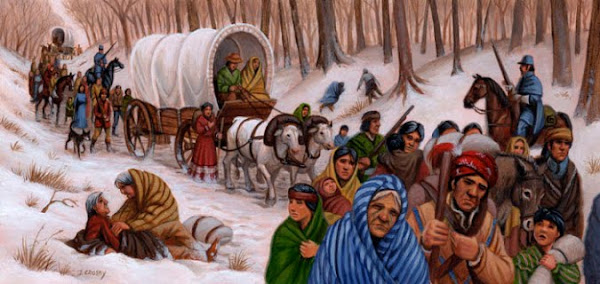We finally arrived at our destination. Nearly 4000 Cherokee have died so far. There are still more on their way. Those of us who survived the trip will have to re-build our nation. The rift formed by the differences between the National and Treaty party have not healed. In fact, the divisions between the Cherokee have grown more prominent as a result of the journey.
Regardless of our differences, it is up to us to re-build the Cherokee Nation. We will have to work hard to ensure our nation's survival. Though it may be a rough and twisty road, but we are a strong people. Now, we morn for our lost brothers and sisters; tomorrow, we begin re-building our nation. (Sequence of Events) (Global Security) (Illinois General Assembly)
16 December, 2009
December 4, 1838
Today we reached the Mississippi river. My spirit is heavy. Already so many have died. My mother passed away on November 23. My youngest brother is sick. Half the Cherokee in our group have fallen sick to one ailment or another. I am one of the strongest amongst us and even I am tired and weary. We cannot cross the river because of the snow and ice so we have no choice but to camp and wait. We are exposed in the elements and can not go to the town because the whites are afraid we would spread small pox. Many die every day. If we stay here much longer, no one will survive to tell our tale... (Sequence of Events) (Illinois General Assembly)
October 30, 1838
We have been told to prepare to leave tomorrow for the long journey to the Oklahoma territory. We have no winter clothing and most of us dont even have moccasins to put on our feet. Blankets were distributed to us today. I have heard rumors saying these blankets were used in a hospital which suffered an outbreak of smallpox. Our already poor immune systems will not be able to fight off the assault of disease and sickness. (Sequence of Events) (Global Security)
August 21, 1838
In June, groups of Cherokee began heading for the eastern territory that is to become our new home. We have heard reports of famine, death, and disease plaugeing the trail thus far. Those who left earlier in the summer faired better because they were able to take steamboats and trains most of the way. I fear that when we are all finally forced to leave, we will have no choice but to walk the thousand miles on foot. (Global Security)
March 3, 1838
A few months back, we were moved from the holding fort into some sort of internment camp housing somewhere around 800 Cherokee. We are all deeply saddened at the loss of our heritage. We are forever separated from the sacred lands of our for fathers. (Global Security)
April 1, 1837
Last night I arrived at my new home. Yesterday morning, troops arrived at my village and began herding us like cattle into the meeting hut. The women and children were afraid, no one knew what would happen. We were then numbered off and brought outside where we where made to stand in line as the soldiers marched us off our land. We were only given five minutes to gather our belongings. We arrived that evening at a Fort in Georgia. It is more like a jail. I do not want to stay here. (Global Security)
15 December, 2009
March 7, 1837
At the command of the new president, Martin Van Buren, a force of American milita and regular army men under the command of General Winfield Scott have begun rounding up my people by force! These men call us barbarians, and yet they are the ones forcing us out of our ancestral homes by gunpoint! I have not been taken yet, but I fear soon the time will come. The soldiers are taking the Cherokee to specially constructed forts for this purpose... How can they do this? (Global Security)
December 27, 1836
Many have left. Those Nationalists left are clinging to their property by a string. My family will be one of the last to leave. There is talk of the new president's anti-Indian position and many of us are afraid for what next year will bring. Jackson was a hard and difficult man, I dont know how it could get much worse, but somehow, I have a feeling it will...
January 12, 1836
Today we learned of the passage of a treaty written by a small delegation of Cherokee at New Echota. By the terms of the new Treaty, the Cherokee Nation cedes all lands claimed east of the Great Mississippi river. The National Party leaders are furious they were not consulted. Already there has been much violence between the Cherokee. We must come together and join forces to beat back the flood of white men in our lands, but instead, I fear civil war may be upon us. Now we have no choice. We will be forced to leave unless Congress fails to ratify the treaty, which is not likely. (Kappler)
April 28, 1835
After years of negotiations and trials, the Cherokee people are worse off than ever! We are still being oppressed and many of us now see removal from our territorial lands as innevitable. There has been a division in our Nation. Those who support the Ross Family are called the "National Party," who advocate refusal and resistance, while the Ridge family supporters, known as the "Treaty Party" advocate for the negotiation of a treaty, seeing removal inevitable, which would secure the best terms possilbe for our Nation. I am unsure of which path to take. On the one hand, I have my duity to my Nation and its traditions; on the other, I have the best interest of my people in mind. I do not know what do do... (Wilkins)
Subscribe to:
Comments (Atom)

